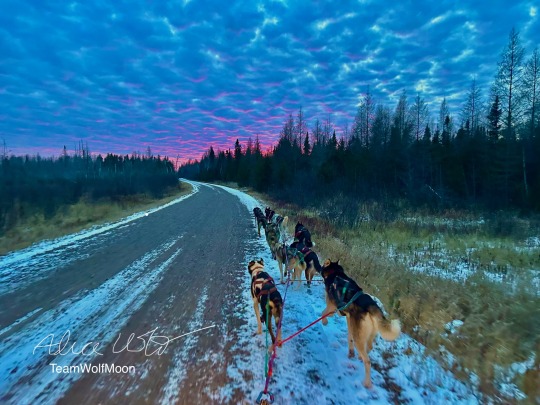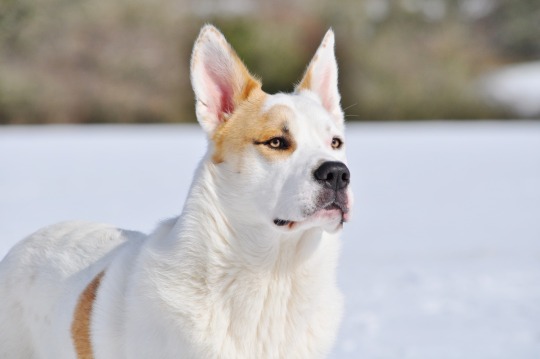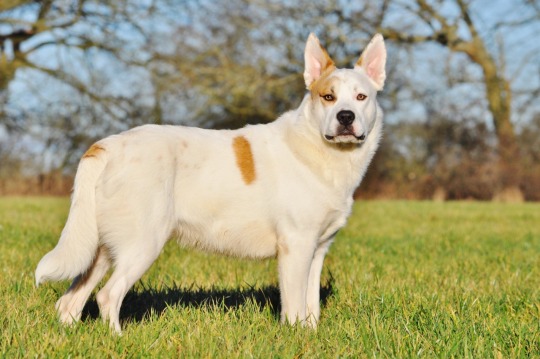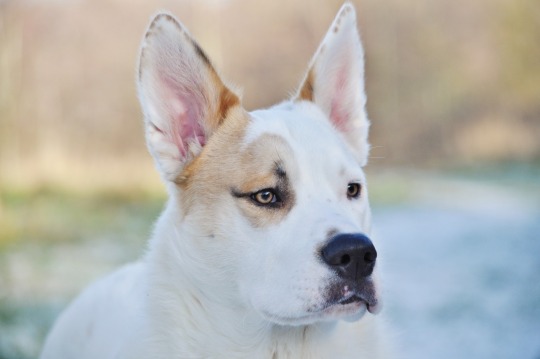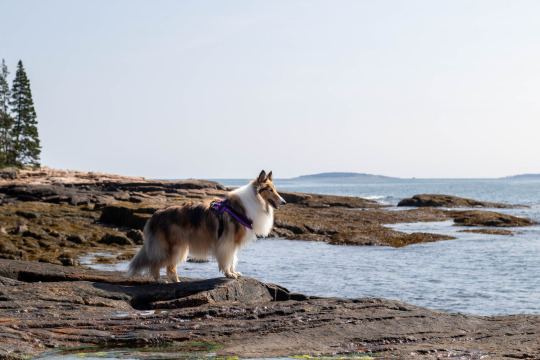Text
"5 things I did differently with my second dog 🥰" i'll tell u what i did differently with my 2nd dog i paid far less attention to the internet
181 notes
·
View notes
Text
Does anyone have any good resources on dog-dog resource guarding in multi-dog households?
I'm looking for force free resources of any kind, so videos, podcasts, books, blogs, whatever, as long as it's sensible and useful.
Please, and thank you!!!
Navi has always been a typical little herding dog who takes it upon herself to "enforce rules" and it was usually not problematic at all, it was moreso a quirk. However, she's tried to guard her bowl and a cardboard box (love that for her) in front of Maisie and a friend's dog in the past month. I'm pretty convinced this is linked to her being in heat, since it's been a tough one for her, but I think we'd benefit from working on this regardless. Don't want it to escalate and create conflict with other dogs and I also don't want her to feel unsafe with her food etc.
I already do a lot of things to manage it, and I know how to work on resource guarding between dogs and people, but I honestly don't have that many resources on dog-dog resource guarding and how to effectively manage or solve it.
64 notes
·
View notes
Text
Man but the notes on that post really are just tumblr showing they have no idea how anything works.
"report to your local animal abuse people not to cops" local animal abuse people would be animal control. Animal control officers are cops.
"rabies is treatable if you go to the doctor right after the bite" rabies is PREVENTABLE, not treatable. There is no cure for rabies. If you suspect you came into contact with a rabid animal, you need to get a series of rabies vaccinations to prevent the virus from taking over your body. This is not a treatment and it only works if you go right away. If you show any symptoms of rabies it is too late.
"rabies is fatal in animals but treatable in humans" rabies has a 100% fatality rate and is not considered a survivable disease at this point in time. If you contract rabies YOU WILL DIE. The "treatment" in humans is called the Milwaukee Protocol, only 14% of people survive it, and it leaves you with massive brain damage and effectively turns you into a vegetable. You do not return to a normal life afterwards. Very few people who have undergone this process are capable of doing more than laying in a hospital bed and eating and breathing through tubes. To my knowledge only one person was able to live a semi-normal life after years and years of ongoing therapy and was not expected to have made it even through her first year after treatment.
I cannot stress enough how rabies is unlike any other disease you may be thinking of. It's required on a federal level in this country to vaccinate pretty much any domestic animal that comes into contact with wildlife for one reason and one reason only: it is not considered possible to cure rabies and the spread of disease would threaten all mammalian life including our own if allowed to continue to propagate.
35K notes
·
View notes
Text
so many people do not understand that 1) animals are not people, and 2) they aren't teaching their animals what they THINK they are teaching them.
dog group on the book of faces, someone is asking for advice on how to get their dog to come to them after the dog is done relieving itself outside. The dog doesn't like coming to them an they spend ten or twenty minutes or more catching the dog each time to bring it in. Which reminded me of one of many attempts to talk a person through trying to fix exactly this same behavior in *many* other dogs over the years...
Me: So, a quick question for you... does the dog not coming to you and you having to chase them down frustrate you?
Them: Of course!
Me: So what do you do when you finally either catch the dog or get them to come to you?
Them: I give the dog a correction!
Me: So. You get hands on your dog and then you immediately punish them for allowing you to get hands on them. And you wonder why your dog has developed the habit of not coming to you?
Them: No, that's not... I'm punishing them for not coming when I call!
Me: Which was.... fifteen minutes ago, or so, you said?
Them: Yes, when I first called them!
Me: Dogs brains literally cannot link an abstract thought like that. A thought and a consequence MUST happen within 2.4 seconds of one another, or the consequence becomes linked to the most recent behavior, thought, or activity. So, tell me... how is your dog supposed to understand that you punishing them is for the event fifteen minutes ago when you have made such a concerted, if unintentional, effort to teach them that them getting close enough for you to lay hands on them in the yard means an immediate punishment?
Them: But that's not what I *meant*!
Me: Doesn't matter what YOU meant... what THEY learned is that they come to you, and they get punished. Stop punishing your dog for the behavior that you want to see more of.
Stop anthropomorphizing your animals, folks. They don't think like us. Stop setting them - and yourself - up for failure.
23K notes
·
View notes
Text
I love it when dogs try to help but the task at hand requires zero dogs so they just kinda stand in front of you and look serious.
231K notes
·
View notes
Text
Probably not a popular take, but I feel like most big negative opinions in dog spaces come from misuse rather than inherent badness of the things. I know dogs who have been hugely helped in their socialization and reactivity by the mindful use of dog parks. I know dogs who get walks and freedom they would never have gotten in their homes without the appropriate use of a prong, training harness, or ecollar. I use a retractable leash for tracking and am currently using it to clean up play skills for mondio at my club's recommendation.
It's not an either or. You can use decompression hikes and controlled walks. You can teach your dog to calmly watch the world and also take them to appropriate dog parks or play groups. You can use an aversive tool gently or a gentle tool as an aversive.
There's nothing wrong with choosing not to use a certain tool, but there are so many broad strokes used that make people afraid to utilize something that might really increase their dog's quality of life or their own efficacy of communication.
227 notes
·
View notes
Text
“Training should be fun – not you. A common advice given to owners with dogs that are not focused, is that the trainer needs to be more “fun”. I think this is the reason why many try to lure the dog back by being “fun”. You should not be “fun”. Rewards should be fun (and of course, you are a part of the reward), and training should be fun. Fun happens with good sessions and good rewards, not with an owner that tries to look like a clown all the time. I think a lot of dogs get nervous when the owner suddenly tries to be “fun”. They will try to calm their owner down by sniffing, looking away and moving slowly (and then the trainer tries to be even more fun…).”
—
Fanny Gott, “How to Get Your Dog to Love Training”. Reward Based Dog Training (22 March 2016).
This is a terrific article that contains many practical tips.
620 notes
·
View notes
Text
Anyone do clicker training with their dog? Looking for some resources to get started with that, I think Belle would benefit greatly from it.
211 notes
·
View notes
Text
“Workingline German Shepherds. When you choose to share your life with one, you are not just getting a ‘straight backed GSD’, you are getting the whole package.
He is not a Labrador with pointed ears.
You will likely get some territorial behaviour and some possessiveness, this is normal, not a temperament fault and you need to train the dog to understand how much or how little you want him to be this way.
You will likely be getting a dog that does not want to to play and socialise with every strange dog he meets, it is normal for a workingline to only want his family and dogs he knows and if you want him to tolerate strange dogs, you have to train for it against his natural instinct to keep his family to himself.
You will likely be getting a dog that doesn’t want to share his toys with strange dogs so be prepared to play with him and his toys yourself and don’t let strange dogs intervene.
You are getting a dog with strong instincts to search, play, chase and tug and these must be satisfied with appropriate games together.
You are getting a dog that is intelligent and quick to learn, good as well as bad so must make a serious effort to train him and give him guidance, you cannot just let him bring himself up. Are you sure you still want one?’
Danton Quarantino posting in AlpineK9 (27 July 2022).
OP isn’t wrong. And these traits are exactly why I love the breed.
179 notes
·
View notes
Text

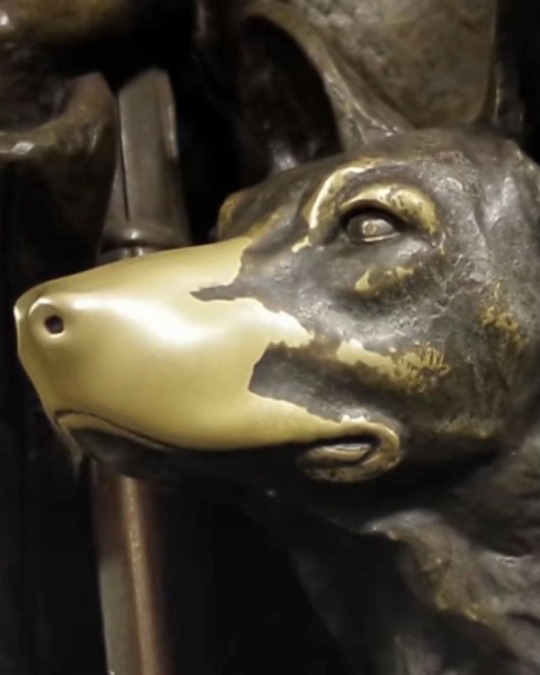


Dog sculptures turned golden from tourists petting them throughout the years
23K notes
·
View notes
Text
As seen on my dobe forum
Persom: I want a doberman, I live in the UK, I want a cropped and docked dog, and I don't want protective instincts
Me internally: don't do it don't do it don't do it
140 notes
·
View notes
Text
I like this post by fxagility on facebook about the training seasons:
1. Debut Strategy - if you've got a dog that's new to competition, take some time just gathering data about their skills in as many different competition situations as you can. Focus on the quality of their experience rather than the results.
2. Winter Training - you're not entering competitions because you're resting, recovering, and focusing on the skills you need to add to your toolbox to support the next competitive season.
3. Spring Training - you're ready to start testing these new skills and take some risks in competition. You're gathering data about your team's skillset and taking that data back to training in order to polish up things that need it. You're giving yourself time between competitions (3-6 weeks) to train those skills before testing them again.
4. Regular Season - ok, you know what your team is capable of and it's time to get to work on acquiring the clear rounds you need in order to advance to your idea of a post-season event, or complete that title you're aiming for.
5. Post-Season - if you've got a special event on your calendar that you're aiming to attend, think of this as the post-season. You want to be able to plan to be at your absolute best at this event, as it will likely tax your team's skills from all angles.
The reality of agility is that it isn't always so tidy moving through these seasons one after another, so we really have to plan so that we can move back and forth between these and give our team enough time to recover from one and gear back up for another.
31 notes
·
View notes
Text
i don't really consider myself to be a great dog trainer, I'm maybe slightly above average on a good day, but most dog owners simply have no idea what the fuck they're doing and it does make me look very good by comparison lol
294 notes
·
View notes
